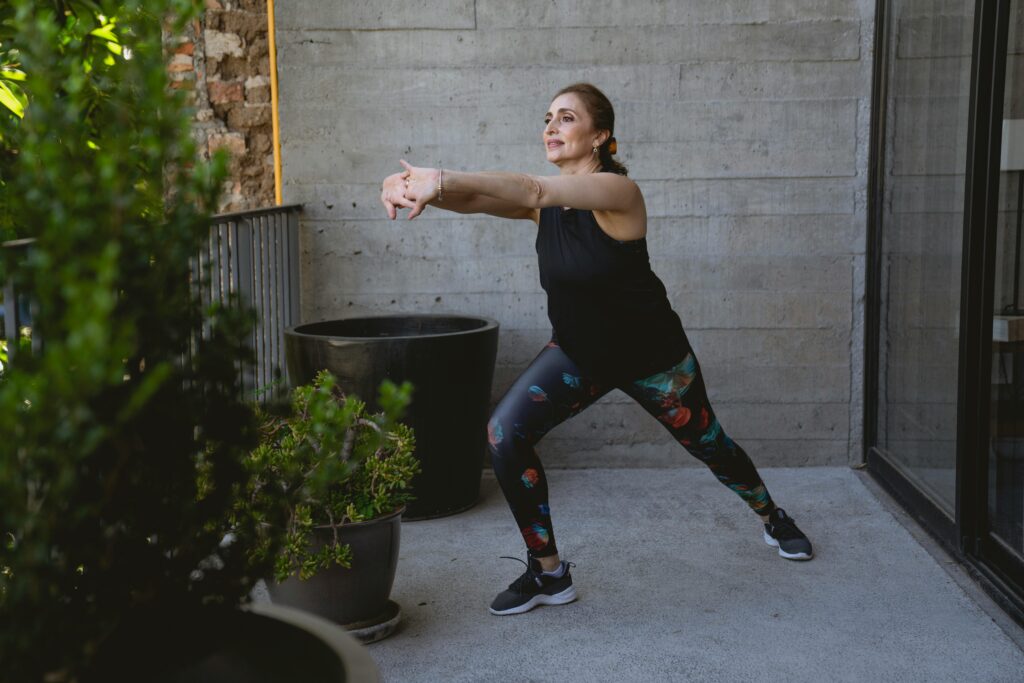Setting Goals: How To Use Them For A Better Peri or Post-Menopause

Setting goals can be life changing. From increasing your movement to mastering your menopause setting goals can help.
A decade in review
Why not do a decade in review, which involves looking back at the last 10 years of your life? Indeed, it’s super interesting (and a bit of a wakeup call!) when you look back on all that happens in a decade. In fact, it can be life-changing and all you need is a notebook and a pen or you can do it on your computer.
So, begin by noting down the momentous and not so momentous happenings that occurred for you this decade.
Suggestions:
- If you’re reading this it’s a pretty safe bet you hit a milestone birthday during the 2010s whether that was 40s, 50s, 60s, 70s, 80s, 90s (or beyond!)
- You might have hit a significant number in your marriage or partnership too.
- Did your body change?
- I’m guessing your hormones started shifting as you hit perimenopause, menopause or post-menopause?
- How about your health? Was there cause for attention?
What else happened?
- Were there familial changes with your parents, your children, your relationship(s)?
- Did your work change? Was that a good thing or a bad thing?
- Maybe things around your home changed?
- What about your interests?
- And your finances?
- Socialising?
- You? Did you feel different?
Ten years is a significant amount of time especially at this stage in our lives. It feels good to take stock of any changes and reflect on the good and the bad.
Then it’s time to look to the future.
If you’re like many women, perimenopause/menopause may have turned your world upside down a little bit.
Setting Resolutions Goals
- For women in midlife making goals can be a good idea because our bodies are changing and so are our lives, needs and wants so giving these shifts some sort of structure can make us feel more comfortable.
- More often than not our kids are growing older (and more independent) or they’ve flown the coop.
- If fertility’s been our burden to bear we must finally come to terms with it.
- Our parents are getting older also and either need care or we’ve gone through caring for them and had to say our goodbyes.
- We might have gone through a separation or divorce last decade and are starting out in a new relationship, or finding ourselves back in the dating game.
- Maybe you’ve downsized your job or started a new business. Perhaps your husband or partner’s done the same and you’ve started said business together.
- There are so many different scenarios that can occur as we head into midlife and they’re not all without their bumps. The only certainty is that life will change so think about what you want for yourself in the next 10 years!
How to make goals work
- Rather than making big audacious goals that may set you up for failure take small steps.
- The reason we recommend writing them down is because they’re 42% more likely to come to fruition. Dr Gail Matthews, a psychology professor in California discovered this figure when she studied the art and science of goal setting. It’s also why to-do lists work so well too.
- And actually if you’re in peri or post-menopause, you may find yourself getting a tad forgetful so a to-do list is a helpful tool even if you’re a non-habitual list writer.
- Put that together with incremental changes (baby steps) and you could make any year a great year as you navigate midlife and the menopausal years.
Science says it works and what have you got to lose?
To give you some small steps ideas:
Exercise
- If you’re not an exerciser resolve to go for a walk every Saturday for 30-minutes.
- Stretch for five minutes three times per week.
- Subscribe to beginners yoga on YouTube – you can do it in front of the TV!
- Ditto for mindfulness or meditation classes. (Proven to help with menopausal signs.)
Nutrition & Weight Management:
- Close the kitchen at 6 or 7 pm. No sneaky snacks afterwards.
- Add a nutrient-rich smoothie to your day (as a meal not a snack).
- Eat a salad on the daily.
- Swap your standard milk chocolate bar for one square of 70%+ dark chocolate.
Managing Menopause
- Breathe deeply. In for 4, hold for 7, breathe out for 8.
- Be honest with those closest to you if you’re experiencing anxiety, insomnia, hot flushes, brain fog.
- Cultivate vitamin H (humour). Tip: persistence wins out.
- Learn how to meditate (see the addendum to yoga under exercise). It might sound woo woo but it’s transformational.
- Take your two capsules of Merry Peri® or Perky Post® together morning or night. Every. Single. Day.
If you’re going to get a planner, use it to set goals for:
- Health
- Fitness
- Family
- Relationships
- Time
- Money
- Work
- Spirit
Finally, let me leave you with this quote from a book called Piloting Your Life that I fell upon as I was writing this piece. It seemed relevant to us:
“For many women who have been caring for and putting others first, midlife is the time when there’s finally space to start thinking about you. You may feel compelled to make room for you, to live with greater purpose, or to answer the call to do something big in the world. It’s during this time that we can begin to define what legacy we want to leave.
If you’ve lost sight of who you are and what you want, it’s time to explore and experiment and define your own new milestones. Up until this point, there have been socially defined milestones like school, first job, maybe marriage, maybe kids, maybe uni, maybe the first house, and then if there are kids, the kids’ milestones. The lack of milestones can make midlife feel like uncharted territory.
It is, and it’s ready to be explored and conquered.
If you’re reading this book, it’s time. Time for you. Time for vision. Time for clarity. Time for you to resolve unresolved issues from your childhood, adolescence, and early twenties. Because if you don’t, they are going to keep resurfacing. Trust me on that.”
― Terri Hanson Mead, Piloting Your Life
If you want support setting goals to help you navigate peri or post-menopause that's where our Meno-Coaching can help.
Share with a friend
Sign up for for weekly wisdom drops & news 🙂
This site is protected by reCAPTCHA and the Google Privacy Policy and Terms of Service apply.
Latest Blog Articles












Unlocking Sleep: Tackling the Root Cause with Elina, The Sleep Expert
It’s time to wake up (pun intended!) because we’re thrilled to introduce you to none other than Elina Winnel, The Sleep Expert.
Elina isn’t just your average “sleep whisperer”—she’s a media darling, regularly sharing her expertise on major TV networks. After battling chronic insomnia herself, she didn’t just hit snooze on the problem.
She developed a science-backed approach that tackles sleep issues at the root—no quick fixes here.
Elina’s method is all about getting to the heart of the problem and transforming your sleep from tossing and turning into total bliss.
She’s helped countless people who once thought restful, rejuvenating sleep was just a dream (see what I did there?).
So grab your favourite pillow, get cosy, and enjoy this enlightening conversation.







